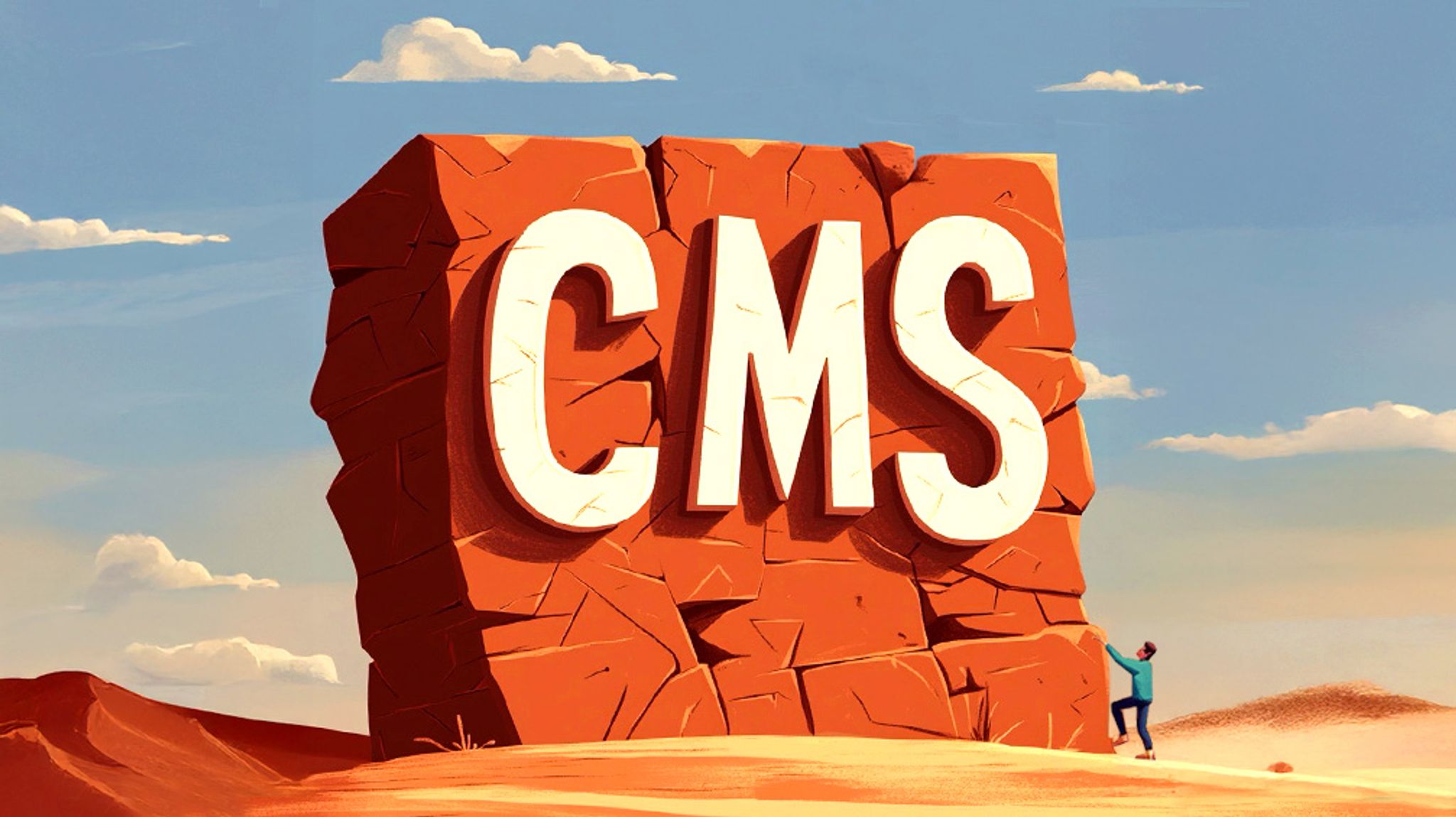Is Your CMS Holding You Back? 5 Signs It’s Time to Rethink Your Platform

Is your CMS slowing down your teams, limiting your growth, or failing to keep up with modern demands? Don't let your platform be the problem. Here are five key indicators to look for – and what you can do to move forward with confidence.
Katie Austin is the Strategic Awareness and Advocacy Lead for Progress Sitefinity and a CMS Critic Contributor.
Your content management system (CMS) is more than just a piece of infrastructure; it’s the foundation of your digital presence. It shapes how quickly you can respond to market changes, how effectively you engage your audience, and how seamlessly your teams collaborate. In short, your CMS is a direct lever on customer experience, speed to market, and digital performance.
Yet, for many organizations, the CMS that once powered growth is now quietly becoming a source of friction. As digital expectations evolve and AI-driven content operations become the norm, legacy platforms often struggle to keep up. What was once a reliable tool can slowly turn into a bottleneck. Slowing down teams, limiting innovation, and creating hidden inefficiencies across your digital ecosystem.
If your CMS feels more like a constraint than a catalyst, it’s time to take a closer look. The signs aren’t always obvious, but they’re there, lurking in your workflows, your analytics, and your team’s frustrations.
In this article, we’ll explore five key indicators that your CMS may be holding you back and what you can do to move forward with confidence.
1. Your CMS Slows Down Marketing Operations
One of the most telling signs that your CMS is no longer serving your business is when it becomes a bottleneck for your marketing team. In today’s digital-first world, marketing agility is non-negotiable. Campaigns need to launch quickly, content must be updated in real time, and teams must be able to respond to trends and customer behavior without delay.
Yet, in many organizations, marketers are still dependent on developers for even the simplest tasks. Take the following examples of updating a homepage banner, creating a landing page, or publishing a blog post. This dependency creates friction, slows down execution, and often leads to missed opportunities.
The problem isn’t your team—it’s your tools. A CMS that lacks marketer-friendly features forces creative teams to work through IT, creating unnecessary backlogs and reducing overall productivity. Worse, it can stifle innovation, as teams avoid experimenting with new formats or channels due to technical constraints.
What to look for:
- Manual content publishing processes that require developer intervention
- Lack of WYSIWYG (what-you-see-is-what-you-get) editing or real-time preview tools
- Inflexible templates that require code changes for layout or design updates
- Delays in campaign launches due to technical bottlenecks
What to do about it:
Modern CMS platforms like Sitefinity are built to eliminate these barriers. With intuitive drag-and-drop interfaces, reusable content blocks, and built-in workflow automation, Sitefinity empowers marketers to take control of the content lifecycle. Teams can launch campaigns faster, iterate more freely, and maintain brand consistency without relying on developers for every change.
The result? Faster time-to-market, more agile marketing operations, and a CMS that truly supports your growth strategy.
2. You’ve Outgrown the Platform
Growth is a good problem to have, until your CMS can’t keep up. As your organization expands into new markets, launches additional brands, or scales its digital footprint, the demands on your content infrastructure increase exponentially. What once worked for a single site or region can quickly become a tangled web of inefficiencies.
If your CMS wasn’t built with scale in mind, you may find yourself duplicating content across multiple sites, struggling to maintain consistent branding, or relying on disconnected tools to manage what should be a unified experience. This not only wastes time and resources but also introduces risk—especially when it comes to compliance, localization, and governance.
What to look for:
- Difficulty managing multi-brand, multi-region, or multilingual content
- Lack of centralized governance, permissions, or approval workflows
- Fragmented user experiences across websites, apps, and channels
- Inconsistent branding or messaging due to siloed content systems
What to do about it:
Sitefinity is purpose-built for organizations that need to scale without sacrificing control. Its multi-site management capabilities allow you to oversee dozens—or even hundreds—of digital properties from a single interface. Granular permissions ensure the right people have access to the right content, while built-in localization tools make it easy to tailor experiences for global audiences.
Whether you're expanding into new markets, consolidating legacy systems, or simply trying to bring order to digital chaos, Sitefinity provides the structure and flexibility to grow with confidence
3. AI Isn’t Embedded (or Is Missing Altogether)
Artificial intelligence is no longer a futuristic concept. It’s a foundational element of modern digital experience platforms. From content creation and personalization to SEO optimization and workflow automation, AI is transforming how marketing and IT teams operate. If your CMS doesn’t support AI or requires complex, custom integrations to do so, you’re likely falling behind.
Today’s digital leaders are using AI to do more with less. They’re automating repetitive tasks, delivering hyper-personalized experiences, and gaining real-time insights that drive smarter decisions. Without AI, your team is left to manually tag content, guess at what will resonate with audiences, and spend hours on tasks that could be handled in seconds.
What to look for:
- Manual tagging, categorization, or SEO optimization
- No personalization or predictive content capabilities
- Lack of automation in content workflows
- Inability to analyze content performance in real time
What to do about it:
With AI-powered digital modernization, Sitefinity integrates AI directly into the content lifecycle, making it accessible and actionable for both marketers and developers. From AI-powered content recommendations and automated SEO enhancements to intelligent segmentation and performance analytics, Sitefinity helps teams work smarter—not harder.
By embedding AI into your CMS, you unlock new levels of efficiency, agility, and customer relevance. It’s not just about keeping the pace, it’s about leading the way.
4. It Doesn’t Integrate with Your Stack
Your CMS doesn’t operate in a vacuum. It needs to connect with your CRM, marketing automation platform, analytics tools, and more. If it doesn’t, you’re left with siloed data, manual handoffs, and limited visibility.
Disconnected systems not only slow down operations but also make it harder to deliver cohesive, data-driven experiences. In today’s omnichannel world, integration isn’t optional, it’s essential.
What to look for:
- Manual data transfers between systems
- Inconsistent customer profiles or reporting
- Limited API or connector support
What to do about it:
Sitefinity’s open architecture and robust integration capabilities makes it easy to connect with the tools you already use. Whether you’re syncing with Salesforce, integrating with Power BI, or connecting to a custom ERP, it ensures your CMS is part of a unified digital ecosystem.
5. Security and Compliance Gaps Are Emerging
Security and compliance are non-negotiable. Especially for enterprises operating in regulated industries or handling sensitive customer data. Unfortunately, many legacy CMS platforms struggle to keep up with evolving standards.
From outdated authentication protocols to limited audit trails, these gaps can expose your organization to risk. And with regulations like GDPR, HIPAA, and CCPA tightening, the stakes are higher than ever.
What to look for:
- Frequent security patches or workarounds
- Difficulty meeting compliance requirements
- Lack of role-based access or audit logging
What to do about it:
Sitefinity is built with enterprise-grade security and compliance in mind. It supports role-based access control, secure hosting, and detailed audit trails, helping you protect data, meet regulatory requirements, and keep customer trust.
Conclusion: Don’t Let Your Platform Be the Problem
Your CMS should be a strategic enabler and not a source of friction. If it’s slowing down your teams, limiting your growth, or failing to keep up with modern demands, it’s time to take a closer look.
The good news? You don’t have to settle. Platforms like Sitefinity are purpose-built to support today’s digital experience leaders—combining marketer-friendly tools, developer flexibility, AI-powered insights, and enterprise-grade security. Discover how Sitefinity powers content-driven digital experiences.
Upcoming Events

CMS Connect 25
August 5-6, 2025 – Montreal, Canada
We are delighted to present the second annual summer edition of our signature global conference dedicated to the content management community! CMS Connect will be held again in beautiful Montreal, Canada, and feature a unique blend of masterclasses, insightful talks, interactive discussions, impactful learning sessions, and authentic networking opportunities. Join vendors, agencies, and customers from across our industry as we engage and collaborate around the future of content management – and hear from the top thought leaders at the only vendor-neutral, in-person conference exclusively focused on CMS. Space is limited for this event, so book your seats today.
